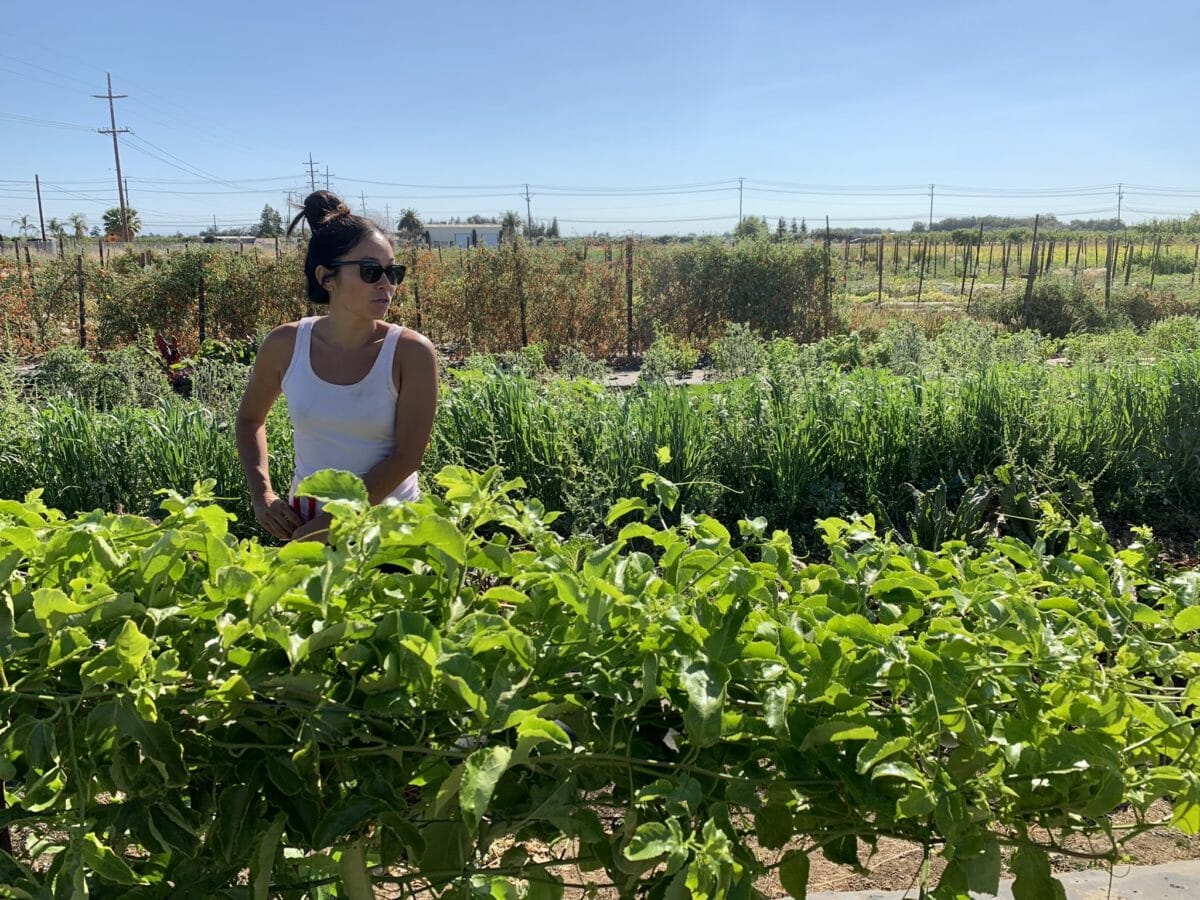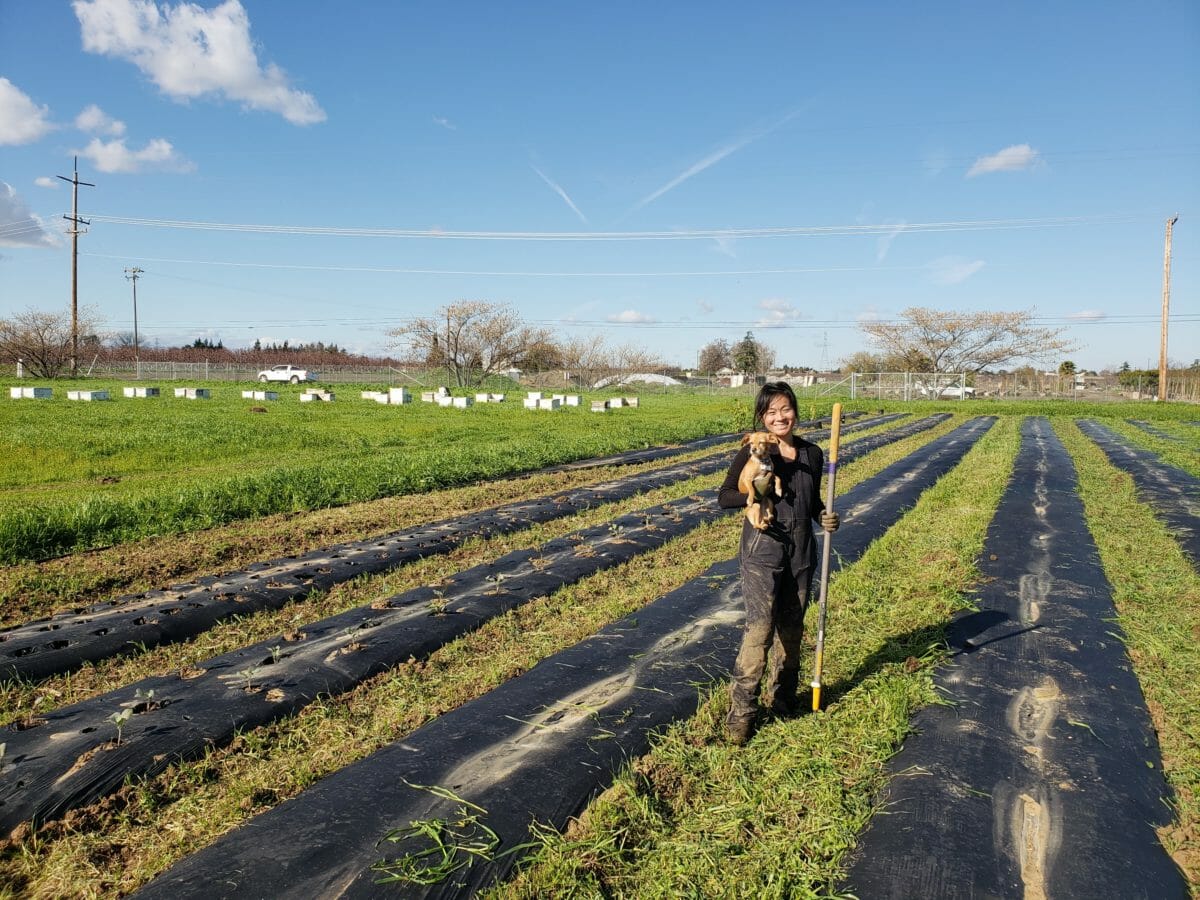Year One: A Farm Can’t Survive Without Customers
The third installment in a series about the challenges new farmers face.
Year One: A Farm Can’t Survive Without Customers
The third installment in a series about the challenges new farmers face.

Erin Eno tends to her crops.courtesy of Erin Eno
Simply working outside with your hands and watching the seeds you plant grow into food are some of the most rewarding things about farming. But having a firm grasp on the business and marketing side of your operations is vital. The most meticulous crop plan can go to waste if you don’t know how you’re going to sell your produce.
Little went as planned for Erin Eno in her first year of farming, especially when it came to finding customers. Eno, who first launched her farm in Brentwood, California, had wanted to sell her produce through a CSA. She aggressively tried to find customers, reaching out to local businesses to potentially network with their customers, and used online advertising to try to build a presence. She even passed out flyers at a public transit station. “I didn’t really think about how difficult it is to sell things to people when they don’t really know who you are,” she says.
Eno began the season with fewer customers than her business plan called for and it didn’t seem like she would get enough revenue from the CSA idea. She started to look for different outlets to sell her produce and decided to join a small farmers market. She says farmers markets can be key for beginning farmers. “That farmers’ market already is doing a lot of the marketing for you, [and] already has a customer base that is coming regularly. So it’s a lot easier,” she says.
On her first day at the market, she happened to meet the chef of a high quality Vietnamese restaurant that valued using locally grown ingredients. This became an important connection for Eno, who hadn’t realized before that a restaurant would be interested in working with her in year one. She thought she would have to prove herself before she could even approach a restaurant, but soon found her vegetables featured on a menu.

Before she launched her farm, Eno had worked in finance at a tech start-up in San Francisco. Farming wasn’t a lifelong passion for her, but she gained inspiration to quit her desk job when she read Growing a Farmer by Kurt Timmermeister. The book chronicles Timmermeister’s own journey to start a profitable farm with little previous agricultural experience or knowledge. Eno says after she read the book, she let it be known that she was going to be a farmer one day.
In order to realize her dream, Eno took a nine-month intensive program with an organization called First Generation Farmers. She started an incubator farm—Cooper’s Harvest—through the program, which included everything from physical work in the field, to learning marketing, business planning and soil health in the classroom. After her first year running her own farm, Eno decided she wanted to work with other people and is now operating Castle Rock Farm in Walnut Creek, California with partners she met through the program.
As she started working on her second season, Eno used feedback and what she learned from her customer base to develop a new crop plan. She learned which kinds of produce typically sell well at farmers markets or what restaurants were looking for. And Castle Rock Farm now offers a CSA with a number of seasonal options.
There was a point in Eno’s life when farming didn’t seem like an imaginable career path for her, but now that she’s more than a year in, she says she can’t see herself doing anything else.
Follow us
This work is licensed under a Creative Commons Attribution-NoDerivatives 4.0 International License.
Want to republish a Modern Farmer story?
We are happy for Modern Farmer stories to be shared, and encourage you to republish our articles for your audience. When doing so, we ask that you follow these guidelines:
Please credit us and our writers
For the author byline, please use “Author Name, Modern Farmer.” At the top of our stories, if on the web, please include this text and link: “This story was originally published by Modern Farmer.”
Please make sure to include a link back to either our home page or the article URL.
At the bottom of the story, please include the following text:
“Modern Farmer is a nonprofit initiative dedicated to raising awareness and catalyzing action at the intersection of food, agriculture, and society. Read more at <link>Modern Farmer</link>.”
Use our widget
We’d like to be able to track our stories, so we ask that if you republish our content, you do so using our widget (located on the left hand side of the article). The HTML code has a built-in tracker that tells us the data and domain where the story was published, as well as view counts.
Check the image requirements
It’s your responsibility to confirm you're licensed to republish images in our articles. Some images, such as those from commercial providers, don't allow their images to be republished without permission or payment. Copyright terms are generally listed in the image caption and attribution. You are welcome to omit our images or substitute with your own. Charts and interactive graphics follow the same rules.
Don’t change too much. Or, ask us first.
Articles must be republished in their entirety. It’s okay to change references to time (“today” to “yesterday”) or location (“Iowa City, IA” to “here”). But please keep everything else the same.
If you feel strongly that a more material edit needs to be made, get in touch with us at [email protected]. We’re happy to discuss it with the original author, but we must have prior approval for changes before publication.
Special cases
Extracts. You may run the first few lines or paragraphs of the article and then say: “Read the full article at Modern Farmer” with a link back to the original article.
Quotes. You may quote authors provided you include a link back to the article URL.
Translations. These require writer approval. To inquire about translation of a Modern Farmer article, contact us at [email protected]
Signed consent / copyright release forms. These are not required, provided you are following these guidelines.
Print. Articles can be republished in print under these same rules, with the exception that you do not need to include the links.
Tag us
When sharing the story on social media, please tag us using the following: - Twitter (@ModFarm) - Facebook (@ModernFarmerMedia) - Instagram (@modfarm)
Use our content respectfully
Modern Farmer is a nonprofit and as such we share our content for free and in good faith in order to reach new audiences. Respectfully,
No selling ads against our stories. It’s okay to put our stories on pages with ads.
Don’t republish our material wholesale, or automatically; you need to select stories to be republished individually.
You have no rights to sell, license, syndicate, or otherwise represent yourself as the authorized owner of our material to any third parties. This means that you cannot actively publish or submit our work for syndication to third party platforms or apps like Apple News or Google News. We understand that publishers cannot fully control when certain third parties automatically summarize or crawl content from publishers’ own sites.
Keep in touch
We want to hear from you if you love Modern Farmer content, have a collaboration idea, or anything else to share. As a nonprofit outlet, we work in service of our community and are always open to comments, feedback, and ideas. Contact us at [email protected].by Alex Robinson, Modern Farmer
July 11, 2020
Modern Farmer Weekly
Solutions Hub
Innovations, ideas and inspiration. Actionable solutions for a resilient food system.
ExploreExplore other topics
Share With Us
We want to hear from Modern Farmer readers who have thoughtful commentary, actionable solutions, or helpful ideas to share.
SubmitNecessary cookies are absolutely essential for the website to function properly. This category only includes cookies that ensures basic functionalities and security features of the website. These cookies do not store any personal information.
Any cookies that may not be particularly necessary for the website to function and are used specifically to collect user personal data via analytics, ads, other embedded contents are termed as non-necessary cookies.
Great stuff ?? mate… stay the course and one day your efforts will reward you…
Tezz from down Under.